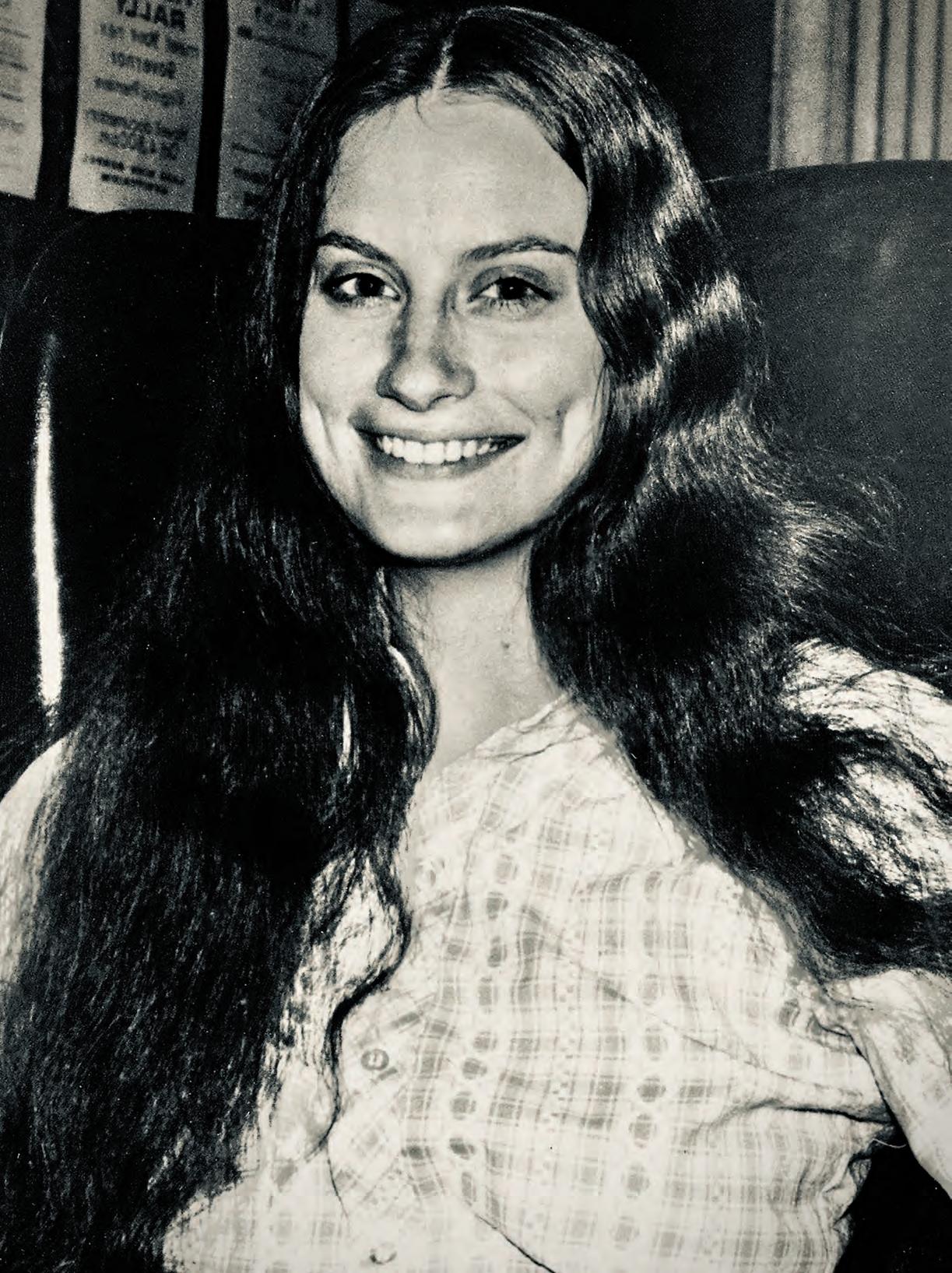
63 minute read
Making Room for Women
A Virginia Law Women Founder Looks Back 50 Years Later
By Eric Williamson
Advertisement
student body was “very low”—6.7% of the total law student population as of fall 1970. Yet women had been a presence at UVA Law since 1920, when three—Elizabeth Tompkins ’23, Rose May Davis and Catherine Lipop—became the first to study law on Grounds.
Five decades later, in 1971, there were only 25 women in the class of 1974.
“And that was pretty typical of all of the major law schools— I’m talking every top 10 law school admitted only about 20 women in every class, and we’re talking Harvard, we’re talking Yale, we’re talking Georgetown, all the major schools,” McFadden said. “So it’s very clear that they had de facto admissions limits on women students.”
Before she arrived, McFadden mailed letters to the female law student body, including incoming members of her class. She asked them if they wanted to organize to promote their shared interests as women.
She received two responses back: one note, one phone call. The students advised her that drawing attention would make
❱Members of Virginia Law Women in 1981-82 included (front row) Ellen Distelheim ’82, Liza S. Forshaw ’82 and Sarah A. Stone ’82; and (back row) Barbara J. LaVerdi ’82 and Elaine Claar Campbell ’82.

A MEETING IN THE LAW SCHOOL’S TINY BASEMENT WOMEN’S LOUNGE 50 years ago helped make space for more women at the Law School.
Mary Jane McFadden ’74—an Ohioan who would go on to become an assistant U.S. attorney and, later, co-founder of the firm McFadden, Winner & Savage—had come to UVA from Ohio State University, where she had some experience wrangling with authority. When her university and others shut down following the Kent State massacre, McFadden was among the students who negotiated terms for reopening. On her way to law school, she anticipated having to negotiate again.
In an interview conducted by the UVA Law Library for its Women’s Oral History Project, she explained that she chose UVA because of its reputation and inviting setting, at least visually. She had checked out the Department of Education statistics, so she knew the number of women in the law their lives harder. The court-ordered admission of women at the undergraduate level had just begun at UVA. McFadden recalled a man spitting at her feet as she walked across Grounds her first week, perhaps assuming she was among the new wave of coeds.
Not to be deterred, however, McFadden kept the conversation going at the Law School, which was then located at Clark Hall on main Grounds. But finding an opportune space to approach other women at the Law School proved challenging. Fortunately, there was one place women could gather without fear of male judgment.
The women’s restroom and lounge area, located in the basement, was perhaps the only place in the building where women could congregate and speak freely—a fact the Virginia Law Weekly acknowledged in a 1962 article reporting on lounge renovations. In contrast, the ground-floor student lounge
Picturing a More Equitable Environment
WITHOUT awareness, what good is having or not having a legal right? That reasoning was the impetus for “Your Legal Rights as a Woman: A Handbook for Virginians,” which Virginia Law Women first published in 1977.
Jackie Blyn ’79, Joan Kuriansky ’77, Diane Pitts ’78, Susan Buckingham Reilly ’78, Diane Smock ’79, and Tracy Thompson ’79 researched and wrote the influential booklet, focused on recently passed laws that worked in women’s favor, as well as ones that did not.
Kuriansky, in an interview last year with Veteran Feminists of America, said their investigation of the law brought women’s lesser legal status to the fore.
“What shocked me was how little rights women really had and the continuing issue of women being treated like property,” she said.
Over the years, the UVA Law Library has collected voluminous materials on Virginia Law Women, including the public’s response to “Your Legal Rights as a Woman.”
“In the VLW manuscript collection here at Law Special Collections, one folder brims with requests for the handbook at the time of its publication,” Kelly Fleming, a curatorial assistant at the Arthur J. Morris Law Library, writes for the library’s

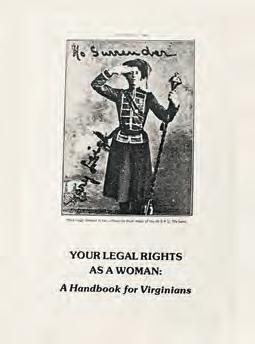

WHILE the contributions of Virginia Law Women over the years are too numerous to cover in one issue, the following images illustrate some of the ways the group has helped improve equity
and equality. ❱ Students, led by members of Virginia Law Women, had a serious talk with Dean Monrad Paulsen in the spring of 1972 about the representation of women at the Law School, including the lack of a tenure-track law professor. Professor Lillian (Altree) BeVier joined the faculty the following year and became tenured soon after.
❱ In 1985, Virginia Law Women hosted a reception for new members at Professor Lillian R. BeVier’s home. ❱ New professors Mildred Ravenell (now Robinson), left, and Julie Roin, right, with an unidentified student, received Jefferson cups during a welcome from the Virginia Law Women in November 1985 at the Ivy Inn.


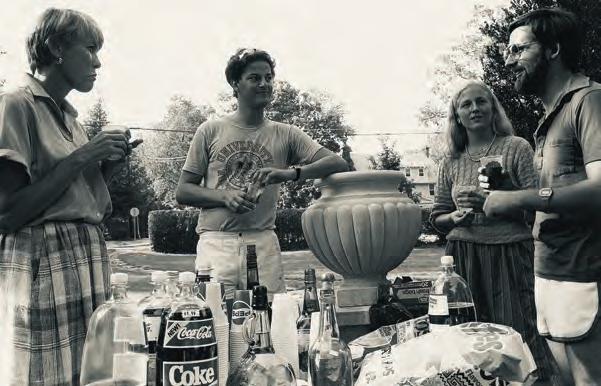
denied female students entrance “as effectively as would written law,” the newspaper wrote of the boys’ club atmosphere. Law Librarian Frances Farmer (and for many years the only female faculty member) had supervised renovations to the women’s space, splitting the lounge portion, and its one window, into staff and student sections. Adjacent to the janitorial office, the renovation was a “common meeting ground for all strata of Law School womankind,” the article stated.
It was there that McFadden first met Diane Hermann ’72, beginning a long friendship that would last until Hermann’s untimely death in 2006.
“There was one women’s restroom, it was in the basement, which meant that if you needed to use the ladies’ room between classes, you’d better hustle,” McFadden said. “And it did have a little anteroom off to the side, which had a little sofa in it, and a chair to sit in. And one day, my first week in law school, I was sitting in that—on the sofa in the little ladies’ room—and this woman with a big grin walks up to me and introduces herself as Dee Hermann. And I told her who I was, and she looked at me and she says, ‘Holy s---.’ She said, ‘You’re the woman that p----- off half the Law School before you even got here.’
“Now, I ask you, how many women do you meet in your life that make you laugh out loud within the first two minutes
❱The “Your Legal Rights as a Woman” handbook authors included Diane Pitts ’78, Tracy Thompson ’79, Diane Smock ’79 and Jackie Blyn ’79; not pictured are Joan Kuriansky ’77 and Susan Buckingham Reilly ’78. MoreUs blog.
“Dozens of women who read about the handbook in the newspaper wrote and asked for copies. Several stated that they planned on using the handbook to help them through their divorces. One high schooler even asked for the handbook as research for a paper on the [Equal Rights Amendment]. The group received requests from rape crisis centers, women’s prison projects, libraries, law schools, the American Association of University Women (AAUW), the ABA, the National Organization of Women (NOW), the Women’s Law Coalition and Legal Aid.”
VLW revised the booklet in 1979 and 1984 to reflect updates in the law.
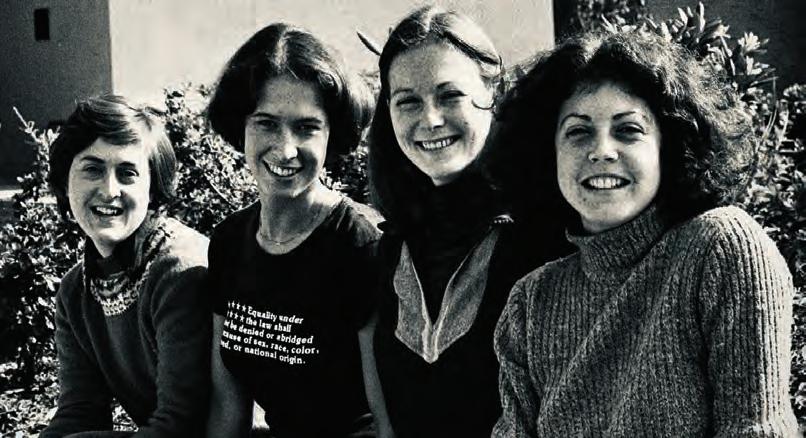
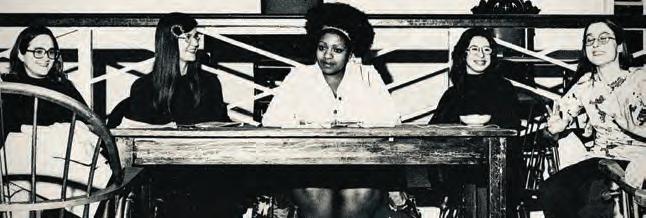
❱ Linda G. Howard ’73 moderated a discussion on “Women in Law” for the John B. Minor Pre-Legal Society. The panelists were Ellen A. Bass ’73, Margaret A. Wilson, Howard, Freda L. Mandl and Catherine B. Tackney.

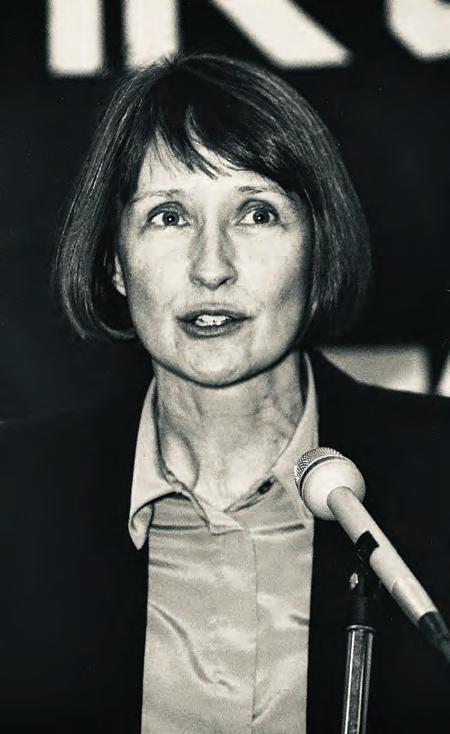
❱ After the Law School moved into its new building on North Grounds, there was a problem. The number of women’s rooms didn’t serve the growing number of female students. Some of the men’s rooms had to be converted, but to avoid retiling, the urinals were left in place. Virginia Law Women in 1984 wanted to make it clear that women were there to stay by putting potted plants in the urinals, and by making a ceremony out of their care.
❱ Amid a historical debate among Virginia Law Women, which for a few years avoided the word “feminist” in order to attract a broader membership, the late 1980s and the early 1990s marked a shift back to embracing the term. Patricia Ireland, president of the National Organization of Women, presented a lecture titled “The Holy War on Women - Theocracy in the Twentieth Century” at the Law School in 1991.
of meeting them?”
Hermann hadn’t received McFadden’s letter. She had been staying in Charlottesville over the summer, and not at her home address on file. But having been arrested in anti-war protests while at Stanford, she was down to join what she viewed as a righteous cause.
Now there were two. Technically, McFadden noted in her oral history, that was enough to form a group.
Dean Monrad Paulsen approved their request for formation without pushback. (Requests after the group was up and running, such as asking that a female student be allowed to advise the faculty hiring committee, did not always go as smoothly.) Paulsen, “oddly enough, was delighted at the idea of having a women law students’ organization,” McFadden said.
At their first meeting, believed to have been Oct. 6, 1971, 10 women decided it was time to make their voices heard. Other co-founders were Elizabeth Trimble ’73, the group’s first president and a future assistant U.S. attorney in Baltimore and assistant attorney general in Maryland; and Ellen Bass Brantley ’73, the group’s first vice president and a future Arkansas circuit judge.
Hermann proposed at the meeting naming the group the Benevolent Association of Lady Law Students.

❱ In the late 1980s, Virginia Law Women initiated the idea for what would become the Journal of Social Policy and Law, first published in 1991. Pictured, Trish Cooper ’95 and Dawn Henry ’95 greet participants attending the first National Women Law Students Association conference in February 1994, sponsored with the journal.
❱ Virginia Law Women sold “make love not law review” T-shirts in the early 1980s.
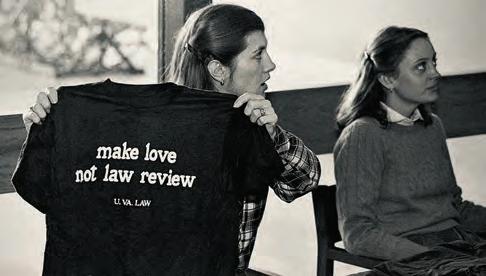
❱ Pictured here in 2019, Virginia Law Women today hosts multiple events each year, often in association with other student organizations, on issues related to women, or equality and equity more generally.
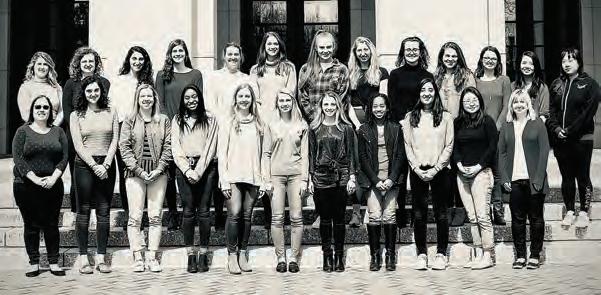
according to her obituary in the San Francisco Chronicle. Hermann would go on from law school to work in the San Francisco City Attorney’s Office for more than two decades. In that office, she earned the nickname “killer” for her persistence on cases, and rose to head of code enforcement.
The women agreed on a more serious name for the group, Virginia Law Women, and established their goals: to address discrimination in admissions, faculty hiring and job recruiting on Grounds.
That spring, the Law School set new standards for how employers conducted job interviews, began to root out discriminatory firms, and added a new course on women and
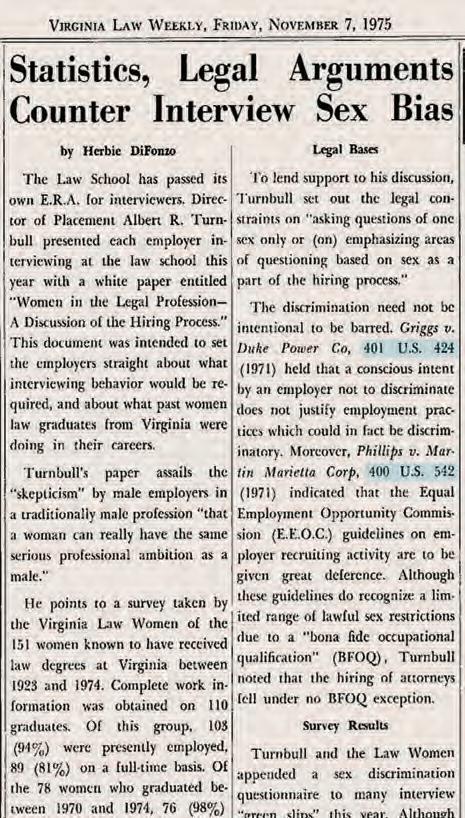

Women at Work
❱ In the fall of 1974, working with the UVA Law Placement Office to address sex discrimination in the hiring process, members of Virginia Law Women researched the careers of all alumnae and sent out surveys to living alumnae. The results showed how active alumnae were in the legal profession. Of the more recent graduates, 98% worked outside the home, countering discriminatory perceptions that women were mostly dedicated to home life. The Placement Office incorporated the statistics into a white paper titled “Women in the Legal Profession – A Discussion of Hiring Process.” The paper was given to interviewing firms and outlined the Law School’s commitment the enforcing Title IX.
PICTURED ABOVE VLW members in 1975: Dolores H. Dabney ’77, Deborah S. Ryan ’77 and Linda J. McKay ’75.
the law, though it was taught by men. The following school year, 1972-73, the incoming class included 41 women. In 1973, the Law School’s first female tenure-track professor, Lillian R. BeVier, was hired and began teaching. McFadden said the changes were in large part a result of the group’s efforts.
“And so I guess we did accomplish something that [first] year, even though it was very incremental,” she said.
Today, women comprise 52% of the Class of 2023, which began their studies in the fall. —With research from the UVA Law Special Collections Department


❱Professor A. E. Dick Howard ’61 speaks in Falls Church in 1969 at an open forum about revising Virginia’s Constitution.
FACULTY NEWS CONSTITUTIONAL CHANGE-MAKER
50 Years Later, Professor A. E. Dick Howard ’61Reflects on LeadingVirginia Constitution’s Revision
When Virginia lawmakers wanted to overhaul the state’s Jim Crow-era constitution 50 years ago, Professor A. E. DICK HOWARD ’61 answered the call.
He served as executive director of the Commission on Constitutional Revision and directed the successful referendum campaign for the new constitution’s ratification, which took effect in 1971.
Howard talked to UVA Lawyer about what spurred the constitution’s revision and how it took shape.
WHY DID VIRGINIA’S LEADERS DECIDE THAT THE CONSTITUTION SHOULD BE REVISED?
The need for revision had its roots in the Civil War and Reconstruction period. After the Civil War, each former Confederate state, to be readmitted to the Union, had to write a new state constitution. Virginia’s 1870 constitution was a progressive document but one which conservative Virginians resented as having been imposed on them. When Reconstruction ended, each of the Southern states, including Virginia, set out to scrap the postwar constitutions. Virginia’s post-Reconstruction convention met in 1901-02. The delegates at that convention acted to make white supremacy the core object of Virginia’s constitution. To that end, they set out to disenfranchise as many Black Virginians as they possibly could. They employed such devices as the poll tax and complicated registration requirements. The result was excising most Black voters (and many poor white voters as well) from the rolls. Fast forward to the 1960s. That turbulent decade saw the assassination of John F.
Kennedy, ROBERT F. KENNEDY ’51 and Martin Luther King Jr. It saw protests and destruction in major American cities. Moreover, major legal changes were afoot. The Supreme Court decreed one person, one vote in the drawing of legislative districts. Congress enacted the Voting Rights Act of 1965, coverage of which included Virginia. Virginia itself was changing. Largely rural in 1902, Virginia was fast urbanizing. Long in the grip of the Byrd Machine [the rural political machine led by former governor and U.S. Senator Harry F. Byrd, a conservative Democrat], Virginia was becoming a two-party state. The poll tax had been declared unconstitutional. Massive resistance to school desegregation had brought a Supreme Court decision ordering Prince Edward County to reopen its schools. The constitutional shoe cobbled in 1902 clearly no longer fit the commonwealth.
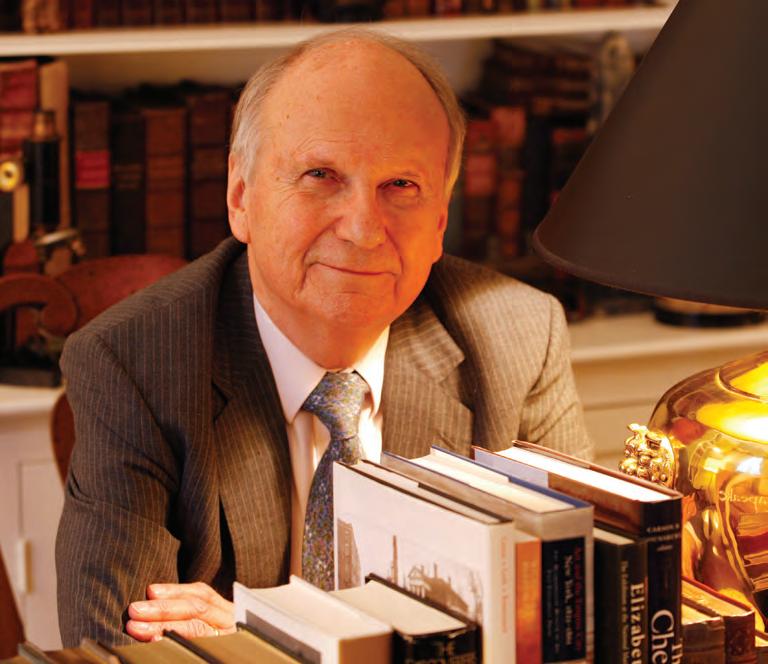
HOW DID VIRGINIA GO ABOUT REVISING THE CONSTITUTION?
In 1968, Governor Mills E. Godwin Jr. called on the General Assembly to provide for the creation of a Commission on Constitutional Revision. That commission included some remarkable members. Among them were Lewis F. Powell Jr., later to sit on the U.S. Supreme Court; Virginia’s leading civil
rights attorney, Oliver Hill; former Governor Colgate Darden; and the Law School’s dean, HARDY C. DILLARD ’27. They called on me to serve as their executive director, to assist in the drafting process.
The commission presented its report to the General Assembly in January 1969. I served as counsel to the General Assembly during the special session in 1969 and at the regular session in 1970. After the legislators had made further revisions to the commission’s draft, the proposed constitution went on the ballot in November 1970. Governor Linwood Holton asked me to direct the referendum campaign. Democrats, Republicans and Byrd independents aided in the campaign. The new constitution was adopted by a vote of 72%.
WHAT WERE THE NEW CONSTITUTION’S GOALS? WHAT ARE SOME OF ITS ACHIEVEMENTS?
The members of the revision commission set out to repudiate the racist assumptions that tainted the 1902 constitution. Looking to the future, the revisers were especially concerned to place public education on a sound and progressive footing. The new constitution mandates the General Assembly to provide for a public school system for every school-age Virginian. Localities are under a constitutional mandate to provide their share of school funding under a formula to be crafted by the General Assembly—no more Prince Edward counties [the county closed public schools for five years and diverted funds to a white private school]. The Board of Education is tasked with devising Standards of Quality, with the General Assembly having final authority. Drawing on Thomas Jefferson’s Bill for the More General Diffusion of Knowledge, the revisers put education in Virginia’s Bill of Rights, alongside familiar rights such as freedom of religion and of expression.
Other important provisions include the right to be free from government discrimination on the basis of race, color, national origin or sex. The constitution has an article on environmental quality, a subject not addressed in the 1902 constitution. The General Assembly now meets in annual sessions; the previous constitution had called for biennial meetings.
More generally, the 1971 constitution is more responsive to the needs of modern society than was its predecessor. Not only was the 1902 constitution hobbled by its racist origins, it was drafted during a time when state constitutions tended to excessive length and detail. Many of their provisions belonged in the statute books, not in a constitution. Virginia’s 1971 constitution is about half the length of that drafted in 1902.
—Mike Fox
KENNETH S. ABRAHAM presented two papers at online events: “The Nature of Municipal Liability Insurance if Qualified Immunity Is Repealed” at a University of Texas School of Law symposium on “Race and Policing” on Feb. 18, and “The Underappreciated Risk of a Cyber Insurance Catastrophe” at a conference on “The Role of Law and Government in Cyber Insurance Markets” hosted by the University of Connecticut School of Law on March 12. He published the seventh edition of “Insurance Law and Regulation: Cases and Materials” (co-authored with Daniel Schwarcz), the article “Insurance” in “The Oxford Handbook of the New Private Law,” and “Conceptualizing Tort Law: The Continuous (and Continuing) Struggle” (co-authored with
G. EDWARD WHITE) in the Maryland Law Review. In addition, the University of Virginia Press has accepted for publication a book he coauthored with White, “Tort Law and the Construction of Change: Studies in the Inevitability of History.”
ANDREW BLOCK spent the majority of the fall semester launching the new State and Local Government Policy Clinic. During the fall, students worked in teams of two and had executive branch as well as legislative branch clients (see p. 24). Students wrote research and policy memos for their executive branch clients, and also played a substantial role in writing the final report to Gov. Ralph Northam from the Commission to Examine Racial Inequity in Virginia Law (see p. 13). In addition, each team of two students worked with a member of the Virginia General Assembly. The students worked with these clients on all aspects of legislative development, from researching potential strategies to address the problems that their clients identified, to presenting their research findings to the legislators to help identify the best path, to meeting with stakeholders to get input and feedback on their ideas, and then helping draft the actual legislation.
Once the bills were crafted, students developed supporting documents, including one-pagers and press materials; met with additional stakeholders and bill opponents, as necessary, to identify potential areas of compromise; drafted potential amendments to their bills and, once the legislative session started, testified before legislative committees. The students’ legislation covers a range of topics, including the following: improving access to unemployment insurance benefits; creating procedural protections for the many people with intellectual and developmental disabilities, and serious mental illness, in Virginia’s criminal justice system; piloting a new approach to septic systems in areas of coastal flooding to address ongoing sealevel rise; amending the Virginia Constitution to protect the right to vote for people with felony convictions; and reforming Virginia’s approach to standardized testing for elementary school children. Block and his students also planned to take on local government clients Over the past several
years, RICHARD J. BONNIE ’69 and the faculty of the Institute of Law, Psychiatry and Public Policy have conducted a series of seminars on mental health law reform, assisting legislative and stakeholder work groups focusing on key issues, including emergency services, mandatory outpatient treatment and diversion of people with mental illness from the criminal justice system. Legislation developed by the ILPPP was enacted during the 2021 session of the Virginia General Assembly, including a major overhaul of the statutes governing mandatory outpatient treatment proposed by an ILPPP work group chaired by Bonnie after a three-year effort. In addition, the General Assembly directed state criminal justice agencies and health agencies to develop a plan for linking data from all of the agencies, and then de-identify it, thereby allowing policy-related outcomes to be monitored and quantified in both domains. This “relational database” would include criminal arrests and dispositions as well as mental hospitalizations and firearm removal orders. Bonnie and the ILPPP staff are also working with the American Bar Association’s Commission on Aging and specialty organizations in neurology and psychiatry to develop a policy report on involvement of people with dementia in the criminal justice system. The grant is funded by the Retirement Research Foundation.
Bonnie completed
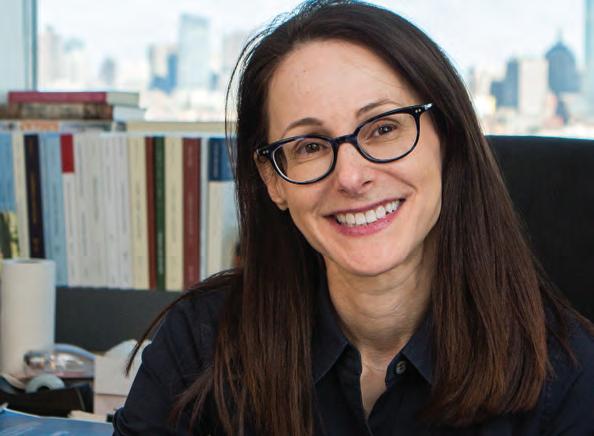
Professor DANIELLE K. CITRON has been working to stamp out how internet companies profit from destructive activity—like so-called “revenge porn” or cyberstalking—for more than a decade.
Citron is now advising lawmakers on how to reform Section 230 of the Communications Decency Act of 1996, which has been used as a shield for internet companies who might otherwise face legal liability for user content.
Section 230 was designed to offer leeway to internet companies to regulate themselves and take down offensive content, but it also has shielded them from civil liability for content published by users. For example, Facebook can either allow (and theoretically profit from) posts purveying false or offensive information, or it can block them. On the extreme end, revenge porn websites face no real repercussions for profiting from abusive content.
“The problem, by my lights, is how the legal shield operates as to under-filtering/blocking—when platforms do too little moderating, or worse,” Citron said. “What Section 230 gets wrong is the provision dealing with when providers fail to address illegality, and worse, encourage illegality. Right now, the provision dealing with under-filtering is not conditioned on anything at all. It is a free pass, so sites can encourage illegality and make money off it and still enjoy the immunity. That is why so-called revenge porn sites are thriving, earning ad revenue from likes, clicks, and shares of eager and growing audiences.”
Citron recently contributed to a bill proposed by U.S. Sens. Mark Warner, Mazie Hirano and Amy Klobuchar, called the SAFE TECH Act. Among the bill’s provisions, online platforms would no longer be able to claim Section 230 immunity for alleged violations of federal or state civil rights laws, antitrust laws, cyberstalking laws, human rights laws or civil actions regarding a wrongful death.
The scholar, who serves as vice president of the Cyber Civil Rights Initiative, a nonprofit devoted to fighting for civil rights and liberties in the digital age, first called for reform in 2008. Now, calls for change have become more widespread.
“After the 2016 election, it became clear that social media platforms were not doing a good-enough job dealing with destructive disinformation and hate speech—much of that involved legally protected speech, but still was bad for democracy and society,” she said. “Congressional staff started to reach out to talk about my proposals.”
After testifying before Congress in 2019, she began working in earnest with staffers to address the problem of under-filtering, including with Warner’s lead adviser on technology and cybersecurity policy, RAFI MARTINA ’10.
Citron, the Jefferson Scholars Foundation Schenck Distinguished Professor in Law at UVA, writes and teaches about privacy, free expression and civil rights. In 2019 she was named a MacArthur Fellow based on her work on cyberstalking and intimate privacy.
—Mary Wood
the second edition of “Public Health Law and Ethics” (with
RUTH GAARE-BERNHEIM ’80) as well as the fourth edition of “The Trial of John W. Hinckley, Jr. – A Case Study in the Insanity Defense”
(with PETER LOW ’63 and JOHN C. JEFFRIES JR. ’73). This final edition includes the opinion by U.S. District Judge Paul Friedman granting Hinckley a conditional release after 34 years of confinement at St. Elizabeth’s Hospital following his acquittal in March 1982 by reason of insanity for the attempted assassination of President Ronald Reagan.
An article by DARRYL
K. BROWN ’90 based on his Barrock Lecture on Criminal Law at Marquette University School of Law, titled “Factually Baseless Enforcement of Criminal Law Is Okay. Full Enforcement is Not,” will be published in the Marquette Law Review. A shorter, magazine-style version of the lecture, “Can Prosecutors Temper the Criminal Code by Bringing Factually Baseless Charges and Charging Nonexistent Crimes?,” appeared in the fall 2020 issue of the Marquette Lawyer magazine.
He also published the book chapter “Disclosure, Security and Costs: Information Access Before Criminal Trials,” in the “Oxford Handbook on Prosecutors and Prosecution”; “Does it Matter Who Objects? Rethinking Responsibility for Litigation Errors” in the Texas Law Review; and “Civil Peace, Criminal Justice, and ‘No Justice No Peace’” in the University of Toronto Law Journal. His Thomas Jefferson Visiting Fellowship at the University of Cambridge has been postponed until 2022.
NAOMI CAHN spoke on three panels at the annual meeting of the Association of American Law Schools, including on programs sponsored by the sections on aging, poverty and socioeconomics. She is on the executive committee of three sections: Aging and the Law (immediate past chair), Family & Juvenile Law, and Women in Legal Education. Several of her articles have been published in Forbes, and her article, “Changing Demographics, Elder Law, and Trusts and Estates,” was recently published in a symposium in the ACTEC Law Journal. She continues to serve as the reporter for the Uniform Law Commission’s Economic Rights of Unmarried Cohabitants Drafting Committee.
KRISTEN E. EICHENSEHR’S article “The Youngstown Canon: Vetoed Bills and the Separation of Powers,” forthcoming in the Duke Law Journal, was cited in Sierra Club v. Trump, a Ninth U.S. Circuit Court of Appeals case on the border wall. She presented the article at a Northwestern Pritzker School of Law virtual faculty workshop in October.
Eichensehr presented “Cyberattacks, Attribution, and the Protection of Medical Facilities” at the Federmann Cyber Security Research Center at the Hebrew University of Jerusalem and the Center for Cyber Law & Policy at the University of Haifa in December during virtual events. She took over as editor of the “Contemporary Practice of the United States” section of the American Journal of International Law. She published “Cyberattack Attribution as Empowerment and Constraint” as part of the Hoover Working Group on National Security, Technology, and Law; and “The Law & Politics of Cyberattack Attribution” in the UCLA Law Review. She presented the latter paper at a virtual event sponsored by Indiana University’s Center for Applied Cybersecurity in August. She was a panelist for “Preventing Harm: How Can States Address Attacks on Healthcare through International Law?” for the World Health Organization and CyberPeace Institute’s “Securing Healthcare to Achieve Cyberpeace” event in December.
MICHAEL GILBERT was named director of UVA Law’s new Center for Public Law and Political Economy (see p. 21). His paper “Active Virtues,” which he co-authored with
MAURICIO GUIM S.J.D. ’18, was published in the Washington University Law Review. Gilbert’s paper “Conflict Avoidance in Constitutional Law,” which he co-authored with
CHARLES BARZUN ’05, was published in the Virginia Law
DEBORAH HELLMAN, Gilbert co-leads a UVA Democracy Initiative called CLEAR: Corruption Lab for Ethics, Accountability, and the Rule of Law. In spring 2021, Gilbert and Hellman co-taught a new course titled The Law of Corruption. Gilbert also taught a virtual course titled Constitutional Law and Economics at Universidad Torcuato di Tella in Buenos Aires.
RACHEL HARMON has published a new casebook, “The Law of the Police,” which introduces readers to the history, goals and problems of policing, and examines the law governing common police activities, such as preventing crime, stopping traffic, use of force and maintaining order (see p. 63). In December, Harmon spoke on “The New Message in Public Outrage,” for the inaugural panel of Harvard Law School’s Policing in America series; gave a workshop on “Maintaining Order” to the University of Chicago Public Law workshop; gave a talk to Charlottesville community members on “Understanding Police Reform and Accountability”; and conducted a lecture and discussion for police officers on the law of the police at the Center for the Constitution at James Madison’s Montpelier. Harmon has also appeared on several podcasts, including Tyler Cowen’s “Conversations with Tyler”; the Financial Times podcast on the history of police funding; and a “Zocalo Public Square” podcast on what society would look like without police. She continues

Professor ASHLEY S. DEEKS was named White House associate counsel and deputy legal adviser to the National Security Council in the new presidential administration.
An expert in national security who previously served as a legal adviser to the State Department, Deeks was among 21 new hires to the Office of the White House Counsel that Joe Biden’s transition team announced Jan. 11.
“My administration has no greater task than restoring faith in American government,” Biden stated in a press release. “Our White House Counsel’s Office will be built upon a foundation of integrity and honesty.”
Deeks will take a leave of absence from the Law School while remaining on the faculty. She joined the Law School in 2012 as an associate professor of law after two years as an academic fellow at Columbia Law School. In 2020 she became director of UVA Law’s National Security Law Center, a position Professor KRISTEN EICHENSEHR has been tapped to fill (see p. 56).
Before academia, she served as the assistant legal adviser for politicalmilitary affairs in the U.S. State Department’s Office of the Legal Adviser, where she worked on issues related to the law of armed conflict, the use of force, conventional weapons and the legal framework for the conflict with al-Qaida. She also provided advice on intelligence issues. In previous positions at the State Department, Deeks advised on international law enforcement, extradition and diplomatic property questions. In 2005, she served as the embassy legal adviser at the U.S. Embassy in Baghdad, during Iraq’s constitutional negotiations.
Deeks, the E. James Kelly, Jr.–Class of 1965 Research Professor of Law, has been a prominent commentator on national security law issues during her time as a professor, including as contributing editor of the Lawfare blog.
She also has been a member of the State Department’s Advisory Committee on International Law and the American Law Institute; on the boards of editors of the American Journal of International Law, the Journal of National Security Law and Policy, and the Texas National Security Review; a senior fellow at the Lieber Institute for Law and Land Warfare; and a faculty senior fellow at the Miller Center.
Deeks received her J.D. with honors from the University of Chicago Law School, where she was elected to the Order of the Coif and served as comment editor on its law review. After graduation, she clerked for Judge Edward R. Becker of the U.S. Court of Appeals for the Third Circuit.
—Eric Williamson
Professor KRISTEN E. EICHENSEHR, a cybersecurity expert, has been named director of UVA Law’s National Security Law Center.
Eichensehr, who joined the Law School in 2020, is a Martha Lubin Karsh and Bruce A. Karsh Bicentennial Professor of Law. She writes and teaches about cybersecurity, foreign relations and separation of powers issues.
The center helps support the academic contributions of faculty and serves as a hub for professors and working professionals to exchange ideas, as well as create increased opportunities for students interested in national security law. “UVA Law is very strong not just on national security, but also in related areas like privacy, international law and criminal law,” Eichensehr said. The center recently hosted the 2021 Cybersecurity Speaker Series, featuring current and former U.S. government officials, in-house and outside counsel, and academic and civil society experts. Eichensehr said national security has traditionally been the purview of governments, but new challenges and technologies make it necessary to broaden one’s understanding of national security players. “It’s not just governments and defense contractors, but also technology companies, social media companies, critical infrastructure entities and others,” she added. “Their involvement as targets of operations as well as providers and defenders of national security raises a host of difficult questions about how to understand their responsibilities to the public and how to make government-private sector relationships productive, while also protecting privacy.”
Before her academic career, Eichensehr served as a special assistant at the U.S. State Department’s Office of the Legal Adviser in the Obama administration. She also practiced at Covington & Burling in Washington, D.C., where she specialized in appellate litigation, international and national security law, and cybersecurity issues.
Eichensehr is an affiliate at the Stanford Center for International Security and Cooperation, and an affiliate scholar at the Center for Internet and Society at Stanford Law School. She is also editor of the American Journal of International Law’s section on “Contemporary Practice of the United States Relating to International Law,” and a member of the editorial boards of Just Security and the Journal of National Security Law & Policy.
She won the 2018 Mike Lewis Prize for National Security Law Scholarship for her article, “Courts, Congress, and the Conduct of Foreign Relations.” In her new role at the National Security Law Center, she succeeds Professor ASHLEY DEEKS, who is on leave from the Law School to serve as White House associate counsel and deputy legal adviser to the National Security Council (see p. 55).
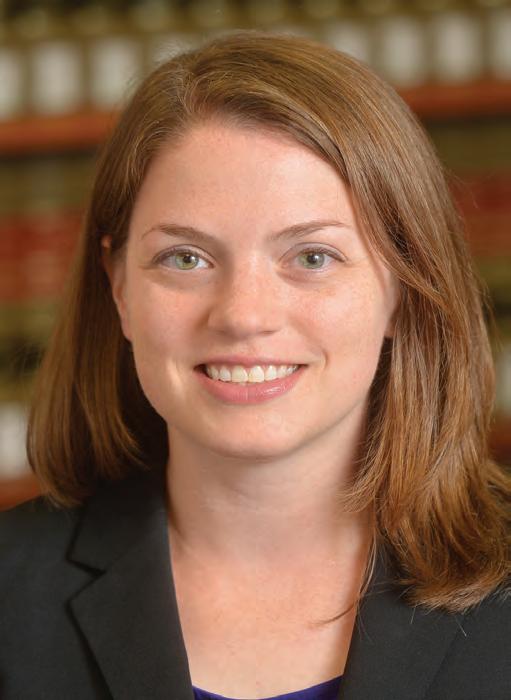
—Mike Fox
to serve as an associate reporter for the American Law Institute’s project on the principles of policing, and is advising several efforts to draft legislation on police use of force and accountability.
ANDREW HAYASHI presented his paper “Dynamic Property Taxes and Racial Gentrification” at a virtual symposium hosted by the Classical Liberal Institute at New York University School of Law, and at “Race and the Law of Business & Finance,” an online workshop that was co-organized
by CATHY HWANG and co-sponsored by the University of Chicago Law School’s Center on Law and Finance and the Law School’s John W. Glynn, Jr. Law & Business Program. He also presented his work on state and local taxes during the pandemic at the annual meeting of the Association of American Law Schools and the University of California at Irvine School of Law. Among other projects, he is currently working on a paper titled “Christianity and the Liberal(ish) Income Tax,” which he presented to students at Harvard Law School in the fall.
DEBORAH HELLMAN published “Sex, Causation and Algorithms: How Equal Protection Prohibits Compounding Prior Injustice” in the Washington University Law Review. She published the op-ed “We must not leave the vulnerable out if we have health care rations,” with Kate Nicholson, in The Hill in December. She presented her paper “The Algorithmic Leviathan” at the Oxford Jurisprudence Discussion Group in December, at the Surrey Symposium on Ethics & Algorithms at the University of Surrey Centre for Law and Philosophy in January, and at the ACM FAccT Conference on Fairness, Accountability and Transparency, which focused on socio-technical systems, in March. In the fall she presented the paper “Big Data and Compounding Injustice” at the “Ethics in AI” conference sponsored by the Center for Analytics and Transformative Technologies at the University of Texas McCombs School of Business in November, and at the Schwartz Reisman Institute for Technology and Society at the University of Toronto in October. She gave the keynote address at the Workshop on Algorithmic Fairness at the University of Copenhagen/University of Aarhus in November. She also presented at the Conference on Politics, Philosophy and Economics at the University of Arizona in February.
CATHY HWANG’S paper “The Social Cost of Contract” (with David A. Hoffman) will be published in the Columbia Law Review in
2021. LAWRENCE SOLUM listed the paper as one of the Downloads of the Year on the “Legal Theory Blog,” and it was featured in JOTWELL. “Shadow
Governance” (with Yaron Nili) was published in the California Law Review. “Shareholder-Driven Stakeholderism” (with Yaron Nili) was published in the University of Chicago Law Review Online. She delivered the John Kidwell Memorial Lecture at the University of Wisconsin Law School. She also helped organize the online workshop on “Race and the Law of Business & Finance,” co-sponsored by the University of Chicago Law School’s Center on Law and Finance and the Law School’s John W. Glynn, Jr. Law & Business Program, in February.
With students in the Environmental Law and Community Engagement Clinic,
CALE JAFFE ’01 represented Consumer Reports (a nonprofit organization that publishes the eponymous magazine) in opposing Trump-era rollbacks of automobile fuel efficiency standards. In March, he spoke at the U.S. Nuclear Regulatory Commission’s annual Regulatory Information Conference. Later that month, he was a panelist at Vermont Law School’s virtual roundtable on the “Emerging Environmental Law Curriculum.”
JOHN C. JEFFRIES JR. ’73 has left his position as senior vice president of the University and returned to full-time teaching in the Law School. He will continue to act as counselor to the president but without administrative responsibilities.
JASON S. JOHNSTON was a panelist for the ABA National Class Action Institute’s “Debate on the Deterrent Effect of Class Actions” in Nashville, Tenn., in 2019, and for a Federalist Society “COVID-19 and the Law” event in June. He presented the paper “Public Valuation of Private Assets” at the New York University Law School Classical Liberal Institute Workshop in October. His paper “Environmental Permits: Public Property Rights and the Extraction and Redistribution of Private Value” is forthcoming in the Notre Dame Law Review.
LESLIE KENDRICK ’06 has joined the torts casebook “Tort Law: Responsibilities and Redress” with coauthors John Goldberg of Harvard Law School, Anthony Sebok of Cardozo Law and Benjamin Zipursky of Fordham University School of Law. The fifth edition was released in the spring. An essay by Kendrick on Miami Herald v. Tornillo is featured in a new book that collects essays on Supreme Court cases from leading scholars, along with reproductions of paintings about those cases by artist Xavier
HARMON CO-AUTHORS RECOMMENDATIONS FOR POLICING REFORM
When it comes to police reform, Professor RACHEL HARMON, who directs the Center for Criminal Justice, has some recommendations for the new presidential administration.
In collaboration with Barry Friedman and the Policing Project at the New York University School of Law, Harmon is advocating for a stronger regulatory approach. Their report, “Policing Priorities for the New Administration,” urges the White House to appoint a policing czar and require that all of the more than 80 federal law enforcement agencies meet basic standards for transparency, among other “clear and actionable” measures. Harmon, a former federal prosecutor before joining the UVA Law faculty in 2006, said the previous policy was incoherent and didn’t do enough to help counteract social harms that can occur. “President Biden’s team has already signaled a strong interest in policing reform,” Harmon said. “We are offering concrete suggestions for what to do after they turn the lights back on in Justice Department policing programs abandoned by the Trump administration.”
The report emphasizes solutions that look beyond the immediate policing agenda.
“All federal programs that provide money or equipment for policing should be assessed not only for their efficacy in promoting policing that serves specific national goals, but for the social costs they induce by promoting policing in a particular way,” the report states. “For example, if a program encourages or incentivizes particular policing tactics—such as frequent traffic stops—the social costs of those tactics must be considered in assessing the value of the program.”
Harmon and Friedman, founding director of the Policing Project and author of “Unwarranted: Policing Without Permission,” released the report in December.
The authors list a number of other priorities that could be accomplished, mainly through Department of Justice initiatives and executive orders.
Currently the Class of 1957 Research Professor of Law, Harmon spent eight years as a prosecutor in the U.S. Department of Justice’s Civil Rights Division and the U.S. Attorney’s Office for the Eastern District of Virginia. At the Civil Rights Division, she investigated and prosecuted civil rights crimes nationwide, including hate crimes and cases of excessive force and sexual violence by police officers and other government officials. Her casebook, “The Law of the Police,” will be the first such resource for those seeking to understand, evaluate and reform American law governing police interactions with the public (see p. 63).
Harmon and other UVA Law faculty engage in criminal justice scholarship, with an eye toward making a more just society, through the Center for Criminal Justice.
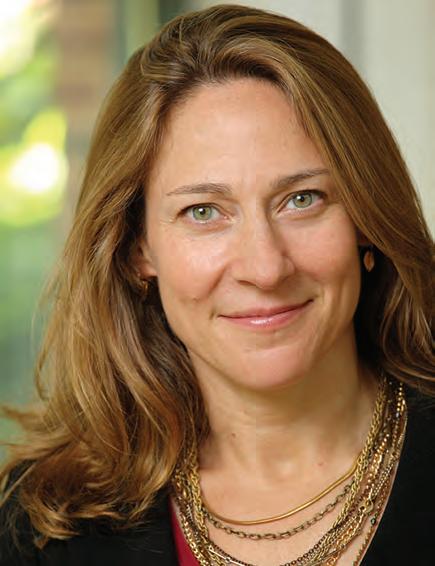
—Eric Williamson

HELLMAN’S PAPER ON ALGORITHMIC DECISION-MAKING WINS AWARD
Professor DEBORAH HELLMAN won the Association of American Law Schools’ Section on Jurisprudence Article Award.
Published in the Virginia Law Review, Hellman’s paper “Measuring Algorithmic Fairness” outlines how best to measure whether algorithms—which are used in everything from pricing insurance to considering risk for recidivism—are fair. Hellman writes that algorithmic decision-making “is both increasingly common and increasingly controversial” due to the potential for discrimination against protected groups.
The awards are hosted by several of AALS’ 103 sections organized around various academic disciplines and topics of interest. This year’s winners were honored during an online awards ceremony at the 2021 AALS Annual Meeting on Jan. 5.
Hellman, a member of the American Law Institute, is author of the book “When Is Discrimination Wrong?” and co-editor of “The Philosophical Foundations of Discrimination Law.” She is the David Lurton Massee, Jr., Professor of Law, and director of the Law School’s Center for Law & Philosophy.
Alumnae ELIZABETH KATZ ’09, a professor at Washington University in St. Louis School of Law, and PAMELA BOOKMAN ’06, a professor at Fordham University School of Law, also picked up AALS prizes for their scholarship.
—Mike Fox
Cortada. “Painting Constitutional Law” was released by Brill in January. Kendrick’s essay “Must Free Speech Be Harmful?” was recently published by the University of Chicago Legal Forum, and her piece “Culpability and Negligence” is forthcoming in the volume “Oxford Studies in Private Law Theory,” published by Oxford University Press.
DOUGLAS LAYCOCK spoke on “The Revival of the Free Exercise Clause?” for a program sponsored by the Religious Freedom Committee of the Section on Civil Rights and Social Justice of the American Bar Association, and on “Continuity, Change, and the Free Exercise Clause” at the joint program of the Constitutional Law and Law and Religion sections of the Association of American Law Schools. He spoke on the Religious Freedom Plenary Workshop at the national conference of the Christian Legal Society, and he briefed the board of the National Association of Evangelicals on the religious liberty implications of Bostock v. Clayton County on sexual-orientation and gender-identity discrimination. He discussed religious liberty on “Civil Rights and Wrongs” on KOOP-FM in Austin, Texas, and the future of religious liberty in America on the podcast “Thinking in Public.” He recently published “Restatement (Third) of Torts: Remedies” with Richard L. Hasen; “Espinoza, Government Funding, and Religious Choice” in the Journal of Law and Religion with Thomas C. Berg; “Do Cuomo’s New Covid Rules Discriminate Against Religion?” in The New York Times in October; “The Right to Be Wrong” in First Things in May; and “Douglas Laycock Replies” in First Things in August.
In December, the Oxford University Press published “Reviving Rationality: Saving Cost-Benefit Analysis for the Sake of the Environment and Our Health”
by MICHAEL A. LIVERMORE and his co-author, Richard L. Revesz of New York University School of Law. (see p. 63) The book argues that the Trump administration inappropriately broke with a decades-long bipartisan consensus over how to evaluate the consequences of agency regulations. Livermore participated in a number of podcast and online events related to the book hosted by institutions such as the Harvard Kennedy School, Resources for the Future, the C. Boyden Gray Center for the Administrative State at George Mason University, the Institute for Policy Integrity at NYU Law, the Environmental Law Institute, UCLA Law’s Emmett Institute, and the Law School’s Program in Law, Communities, and the Environment (PLACE). In addition, Livermore presented work with collaborators Daniel Rockmore (Dartmouth), Keith Carlson (Dartmouth) and Faraz Dadgostari (UVA Systems Engineering) on applying natural language processing and network analysis techniques to the U.S. code at an international conference on “The Physics of Law.” That conference was hosted by Stanford’s Codex Center for Legal Informatics, King’s College London and Bucerius Law School (Hamburg, Germany), among other institutions. Livermore also presented current work with collaborator Vlad Eidelman and FiscalNote applying text analysis techniques to public comments received by administrative agencies at the Online Workshop on the Computational Analysis of Law and the Max Planck Institute for Research on Collective Goods (Bonn, Germany).
According to SSRN,
RUTH MASON authored or co-authored three of the top-10 most downloaded tax articles of 2020. Recently, she and Stephen Daly of King’s College London published a Tax Notes article about the blockbuster decision by the European Union’s lower court to vacate the European Commission’s decision that Ireland granted illegal subsidies to Apple. Mason had previously published work advocating for this result. Additionally, Mason recently presented work in progress via Zoom at Cornell, the University of California at Irvine, Oxford and the University of Wisconsin, and to two online tax seminars organized by multiple schools.
JOHN T. MONAHAN recently published two pieces on violence risk assessment in the law: “Impact of Risk Assessment on Judges’ Fairness in Sentencing Relatively Poor Defendants,” co-authored with Jennifer Skeem of the University of California at Berkeley, and Nicholas Scurich of the University of California at Irvine, in the journal Law and Human Behavior; and “The Classification of Violence Risk” in the “Handbook of Violence Risk Assessment,” edited by Randy Otto and Kevin Douglas. Monahan directs a research project for the John D. and Catherine T. MacArthur Foundation on ways to improve pretrial risk assessment. He also serves on the Advisory Board of Advancing Pretrial Policy and Research, a project of RTI International.
This past fall, THOMAS B. NACHBAR presented his draft paper “Less Restrictive Alternatives and the Ancillary Restraints Doctrine” to a conference on “Antitrust in Big Tech.” In February, he filed an amicus brief in the U.S. Supreme Court in NCAA v. Alston based on arguments he developed in that paper. Last November, he participated in the Nuremberg@75 conference at the Judge Advocate General’s Legal Center and School. His talk focused on the U.S. interest in a stable law of armed conflict and discussed various forces that have caused the law of armed conflict to be unstable over time, including a lack of U.S. engagement on the topic. This spring he will be presenting his latest paper, “Platform Effects,” at a joint Yale Information Society Project and Thurman Arnold Project workshop, and he will coteach (with faculty at the UVA Frank Batten School of Leadership and Public Policy, and the UVA School of Engineering and Applied Science) the second iteration of Innovating for Defense, a projectoriented class in which students are organized as cross-functional teams to solve problems posed by officials at the U.S. Department of Defense.
DANIEL R. ORTIZ delivered a virtual lecture at the Université Panthéon-Sorbonne (Paris I) titled “The Legal Architecture of American Presidential Elections” and engaged more than 200 students and faculty in a subsequent question and answer forum. He participated along with other election law experts in “Litigating the Election,” an event hosted by the Institute of Democracy and the Karsh Center for Law and Democracy, which addressed over 300 cases brought before and after the 2020 presidential election. He also participated in several other public events around the election and advised in some of the surrounding litigation. As director of the Supreme Court Litigation Clinic, he filed, along with others, a cert petition in Wilcox v. Lyons, which asks whether the 14th
SAIKRISHNA PRAKASH participated in several online events related to his book, “The Living Presidency: An Originalist Argument Against Its Ever-Expanding Powers.” He published “Against Constitution by Convention” in the California Law Review, “The Constitution’s First Declared War” in the Virginia Law Review and “The Age of the Winning Executive: The Case of Donald J. Trump” in the Harvard Law Review Forum. Finally, he testified before the Senate Judiciary Committee on the nomination of Amy Coney Barrett, gave a faculty workshop at Harvard and discussed emergency powers before the Virginia Bar Association.
KIMBERLY JENKINS ROBINSON published “Designing the Legal Architecture to Protect Education as a Civil Right” in the Indiana Law Journal. She spoke at The Hunt Institute webinar “Supporting Leadership Diversity and Anti-Racism in Education Change”; at the Education, Leadership & Culture series event “U.S. Department of Education: Practice and Policy,” sponsored by the Institute for Advanced Studies in Culture and Advanced Studies in Culture Foundation; at the Yale Law School’s

JAFFE ’01 APPOINTED TO VIRGINIA ENERGY COMMISSION
Professor CALE JAFFE ’01 has been appointed to the Virginia Coal and Energy Commission.
Gov. Ralph Northam announced the midterm appointment Dec. 18. Jaffe has begun serving his term, which ends June 30, 2023.
Created by state law, the commission makes recommendations to the governor, executive offices and the General Assembly on energy-related matters, including conservation, renewable energy, nuclear power and alternative fuels. The Virginia Coal and Energy Commission consists of seven citizens appointed by the governor and 13 members of the General Assembly.
Jaffe first met with the commission Dec. 21 for a presentation on the Virginia Clean Economy Act, legislation enacted in 2020 to transition the state to a zero-carbon electricity grid by 2050.
Jaffe joined the Law School faculty in 2016 and is director of the Environmental Law and Community Engagement Clinic. He previously served as an attorney with the Southern Environmental Law Center and was director of the center’s Virginia office from 2013-16. He was part of the SELC team that won a unanimous victory before the U.S. Supreme Court in Environmental Defense v. Duke Energy in 2007, and he has litigated numerous energy-related cases before the State Corporation Commission. In 2014, Jaffe was appointed by Gov. Terry McAuliffe to serve on the Governor’s Climate Change and Resiliency Update Commission.
Under Jaffe’s leadership, the clinic and its students have helped defend Virginia’s uranium mining ban via U.S. Supreme Court amicus, joined a fight to preserve a historic Black schoolhouse, proposed renewable energy development on abandoned mines and successfully argued on behalf of clients before the State Corporation Commission.
“I am excited to see how the commission might provide an opportunity for clinic students to work with me on some cutting-edge energy policy questions,” he said. “And of course, at the same time I hope we’ll provide a useful public service to the commonwealth.” —Mike Fox

ROBINSONELECTED TO AMERICAN LAW INSTITUTE
Professor KIMBERLY JENKINS ROBINSON was elected a member of the American Law Institute.
There are now 25 members of the UVA Law faculty currently affiliated with ALI.
The institute is the leading independent organization in the United States producing scholarly work to clarify, modernize and otherwise improve the law. The organization includes judges, lawyers and law professors from the United States and abroad, selected on the basis of professional achievement and demonstrated interest in improving the law.
Robinson, who joined the Law School in 2019, was among 36 new members inducted in October nationwide.
Robinson is the Elizabeth D. and Richard A. Merrill Professor of Law; a professor of education at the Curry School of Education; and a professor of law, education and public policy at the Frank Batten School of Leadership and Public Policy. She is a national expert who speaks domestically and internationally about educational equity, equal educational opportunity, civil rights and the federal role in education.
She is editor of the book “A Federal Right to Education: Fundamental Questions for Our Democracy” and co-editor of “The Enduring Legacy of Rodriguez: Creating New Pathways to Equal Educational Opportunity.” Robinson’s article “Disrupting Education Federalism” won the 2016 Steven S. Goldberg Award for distinguished scholarship in education law from the Education Law Association.
Members were selected from confidential nominations submitted by ALI members. ALI was formed in 1923 “to promote the clarification and simplification of the law and its better adaptation to social needs, to secure the better administration of justice, and to encourage and carry on scholarly and scientific legal work.”
Alumni DANIEL A. BRESS ’05, CATHY LESSER MANSFIELD ’87, JACOB H. ROOKSBY ’07 and CATE STETSON ’94 also were elected to the American Law Institute (see p. 85).
—Mike Fox
virtual workshop series “COVID-19: Law, Economics Governance,” in a workshop on COVID and education; at the Washington and Lee Journal of Civil Rights and Social Justice’s “Race and the Pandemic” symposium; and at the UVA Miller Center virtual talk “School Reopenings: Technology and the Widening Gap.”
The Law School hosted a symposium on her book “Fundamental Questions for Our Democracy Regarding a Federal Right to Education,” at which she spoke as a panelist with other contributors to the book. UVA Presi-
dent JAMES E. RYAN ’92 and Harvard Law School professor Martha Minow served as moderators for the November event. She also delivered the West Virginia University College of Law’s Charles L. Ihlenfeld Lecture, “A Federal Right to Education: Foundational Questions for the Future of Our Nation.” She was a guest lecturer on “School Funding and a Federal Right to Education” at Georgetown University’s Educonomics Lab.
GEORGE RUTHERGLEN’S article “Reconstruction in Legal Theory” has been published and his article on “Admiralty, Human Rights, and International Law” will appear in the Virginia Journal of International Law. He is currently working on two articles, “National Injunctions: Why Not Follow the Rule” and “Ad Hoc Substitutes for Choice of Law,” and on a new edition of the casebook “Employment Discrimination: Law and Theory.” In addition, he worked on an amicus brief submitted on behalf of the plaintiffs in Black Lives Matter v. Trump.
FREDERICK SCHAUER delivered online lectures on legal positivism at a master’s program in legal theory at Johann Goethe University in Frankfurt, Germany; on constitutional developments in the United States at the University of Graz in Austria; on statistical evidence at the Jurisprudence Discussion Group at Oxford University; on free speech and incitement at George Washington University School of Law; on rules and exceptions at the University of Rio Grande in Porto Alegre, Brazil; and on the politics of freedom of expression to both the Lord Reading Law Society in Montreal and the West Virginia State Bar Association. He edited (with Adrienne Stone) the “Oxford Handbook of Freedom of Speech,” which was published in January. Schauer published the articles “Free Speech Overrides” in the University of Chicago Legal Forum; “Normative Legal Positivism” in the “Cambridge Companion to Legal Positivism”; “Ruleness” in “Legal Rules in Practice” (published by Routledge); “Constructing Interpretation” in the Boston University Law Review; “Rules, Defeasibility, and the Psychology of Exceptions,” in “Exceptions in International Law” (Cambridge University Press); and “Social Science and the Philosophy of Law” in the “Cambridge Companion to Philosophy of Law.” In the fall, RICHARD C. SCHRAGGER presented a draft article, “Local Control of Land Use: A Partial Defense,” at virtual workshops at the Minnesota, Willamette and Cardozo law schools. He organized and participated in a virtual conference at the UVA Miller Center on “The Past and Future of Home Rule in Virginia” and spoke on the same subject at the Richmond First Club. He was a guest lecturer on “Pandemic Federalism” at the Université PanthéonSorbonne (Paris I), and he organized and moderated “PLACE and Power: Seeking Racial Equity,” an inaugural event for the Law School’s newly established Program in Law, Communities, and the Environment (PLACE). Schragger’s article, “Of Crosses and Confederate Monuments: A Theory of Unconstitutional Government Speech” was published by the Arizona Law Review.
BARBARA A. SPELLMAN published “In Defense of Weird Hypotheticals” as an invited comment on Ron Allen’s article “Naturalized Epistemology and the Law of Evidence Revisited” in Quaestio Facti: International Journal on Evidential Legal Reasoning. Her chapter with Charles Weaver, called “Memory in the Law,” appears in the “Oxford Handbook of Human Memory—Vol. II:
Applications.” She was a co-author of two large collaborative papers in psychology: “The Future of Women in Psychological Science” and “Psychological Science in the Wake of COVID-19: Social, Methodological, and Meta-Scientific Considerations.” Spellman was featured on the podcast “The Unavailability Workshop for Evidence,” where she spoke about a number of psychology experiments that can be done in the law school classroom and that provide useful demonstrations about how people reason about evidence. She continues to work on the National Institute of Standards and Technology’s OSAC Human Factors Committee and the Crime Scene Investigation Subcommittee, and is now also a Scientific and Technical Review Panel member—with the goal of creating information and performance standards for the forensic sciences. In February, she lectured at the Berkeley Haas School of Business on reforming scientific practices.
PAUL STEPHAN ’77 continues to work as special counsel to the general counsel of the U.S. Department of Defense. His activities have included providing legal support for the presidential transition and the use of the National Guard in the District of Columbia. In his spare time, he has written an article, “Crimea, Panama, and John Bassett Moore—Annexations, Justifications, and Comparative International Law,” and a chapter on antibribery regulation for a book on “Change in the International Order,” to be published by Oxford University Press.
MEGAN T. STEVENSON gave talks at the Boston University Law and Economics Colloquium, University of Toronto Law and Economics Colloquium, University of Chicago Law and Economics Colloquium, University of Kentucky Panel on Bail, Hebrew University of Jerusalem Law and Economics Workshop, UVA Federalist Society Lunch, and American University Economics Workshop. She also gave testimony on bail reform to the U.S. Civil Rights Commission.
In January, GREGG STRAUSS, together with
NAOMI R. CAHN and MICAH J. SCHWARTZMAN ’05, hosted the inaugural event for UVA’s Family Law Center. The online symposium brought together scholars from multiple disciplines to examine Fulton v. City of Philadelphia, a case in which Catholic Social Services argues the city of Philadelphia violated their free exercise rights by not allowing them to certify foster care parents unless they are willing to certify LGBTQ foster parents.Strauss also helped found the Capital Family Scholars Workshop, a springboard to develop family law scholarship by academics in the mid-Atlantic region.
LEON SZEPTYCKI co-authored “The Sustainable Groundwater Management Act and the Common Law of Groundwater Rights–Finding a Consistent Path Forward for Groundwater Allocation” in the UCLA Journal of Environmental Law.
PIERRE-HUGUES VERDIER presented a forthcoming article he co-wrote with
PAUL B. STEPHAN ’77, “International Human Rights and Multinational Corporations: An FCPA Approach,” at a conference organized by Brooklyn Law School and the American Society of International Law’s International Economic Law Interest Group. The article will appear in the Boston University Law Review later this year. He also presented a paper cowritten with KEVIN COPE
and MILA VERSTEEG, “The Global Evolution of Foreign Relations Law,” at the American Society of International Law’s International Law in Domestic Courts Interest Group Annual Workshop. The article is rooted in Verdier and Versteeg’s ongoing comparative project that documents the role of international law in national legal systems, and traces current and historical patterns in these doctrines using quantitative and qualitative methods. This spring, Verdier is teaching International Law, stepping in for
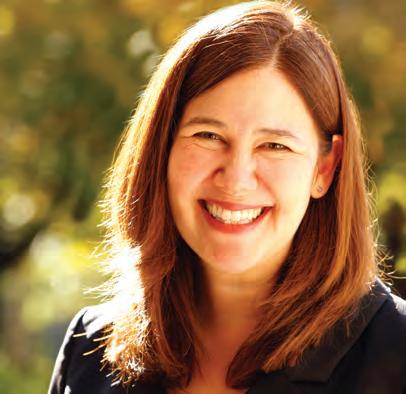
SHADEL ADDS TO THE GREAT COURSES
Professor MOLLY BISHOP SHADEL, who teaches oral advocacy, negotiations and public speaking at the Law School, has been tapped again for The Great Courses series.
Shadel teaches a class for the learning platform on how to speak clearly, effectively and persuasively in various contexts and environments.
The 24-lesson course aims to teach viewers the underpinnings of effective speech writing and skilled delivery in settings both personal and professional.
“Being able to speak effectively can serve you well in so many contexts, and so many people fear public speaking. I wanted to offer this course to help people learn how to do it well and feel more confident about expressing their ideas aloud,” Shadel said. “The course covers topics that are important for lawyers, of course, but it also branches out into other settings, such as how to speak effectively on the job, how to give a great wedding toast or a eulogy, how to nail that business pitch—all sorts of things you might encounter in your personal or professional life.”
Shadel also taught Litigation, released in 2017 as part of The Great Courses’ “Law School for Everyone” series.
The Great Courses expedited filming of the new course, which normally would have taken two weeks, because of the COVID-19 pandemic. All 24 lectures were recorded in five days in Fairfax County, Virginia. Shadel’s hotel accommodations and in-person studio procedures kept social contact at a minimum.
“It was an intense filming schedule, but the Great Courses people know what they are doing,” she said. “We had new protocols about the crew wearing masks and keeping 6 feet or more of distance, so the filming went very well.”
Shadel is the author of two books: “Finding Your Voice in Law School: Mastering Classroom Cold Calls, Job Interviews, and Other Verbal Challenges” and “Tongue-Tied America: Reviving the Art of Verbal Persuasion,” with retired UVA Law professor Robert N. Sayler.
Professor GEORGE S. GEIS has also recorded coursework for “Law School for Everyone.”
—Mike Fox
STEPHAN ’77 SERVES AS SPECIAL COUNSEL AT PENTAGON
Professor PAUL B. STEPHAN ’77, an expert in international and national security law, was appointed special counsel to the general counsel of the U.S. Department of Defense.
General Counsel Paul C. Ney Jr. serves as chief legal officer for the Pentagon and director of the Defense Legal Services Agency, which provides legal advice and services for the defense agencies, field activities and other organizations. Stephan says his job is to assist Ney and the general counsel’s office however he can.
“As a legal academic, I have lived a ridiculously rewarding life, surrounded by students and colleagues who inspire me and living in a part of the country that I truly love,” said Stephan, who accepted the appointment before the COVID-19 pandemic. “I feel an obligation to give something back.” He said his position is analogous to what inhouse counsel would do, except the Pentagon is much larger than any enterprise in the country and has unique missions and challenges. Since starting in August, Stephan said he’s already tackled intellectual property work, employment law, administrative law and constitutional law.
“I hope to come out of this experience a better lawyer and a better professor,” Stephan said.
He will be on leave from the Law School for one year.
Stephan is the John C. Jeffries, Jr., Distinguished Professor of Law and a life member of the American Law Institute. He is an expert on international business, international dispute resolution and comparative law, with an emphasis on Soviet and post-Soviet legal systems.
He has advised governments and international organizations, taken part in cases in the U.S. Supreme Court, the federal courts, and various foreign judicial and arbitral proceedings, and lectured to professionals and scholarly groups around the world on issues raised by the globalization of the world economy. From 2006-07, he served as counselor on international law in the U.S. State Department.
More recently, he served as a coordinating reporter for the American Law Institute’s “Restatement (Fourth) of the Foreign Relations Law of the United States” and is co-editor of “Comparative International Law,” both published in 2018. He is a recipient of the Roger and Madeleine Traynor Faculty Achievement Award, which recognizes scholarship by a senior faculty member.
—Mike Fox
her appointment to the staff of the National Security Council. He is also teaching the Dissertation Colloquium for S.J.D. candidates.
G. EDWARD WHITE published two articles: “‘I Am Better At Narrative Than Analytical History’” in the Buffalo Law Review and, with
KENNETH S. ABRAHAM, “Conceptualizing Tort Law: The Continuous (and Continuing) Struggle” in the Maryland Law Review. Also, Abraham and White’s book “Tort Law and the Construction of Change: Studies in the Inevitability of History” has been accepted for publication by the University of Virginia Press and will appear later this year. White did a podcast interview on his “Law in American History” books on the past and future of the Supreme Court with Ben Chin of MaineBeaconProject. com. The episode was broadcast in December. her appointment to the staff of the National Security Council. He is also teaching the Dissertation Colloquium for S.J.D. candidates. G. EDWARD WHITE published two articles: “‘I Am Better At Narrative Than Analytical History’” in the Buffalo Law Review and, with KENNETH S. ABRAHAM, “Conceptualizing Tort Law: The Continuous (and Continuing) Struggle” in the Maryland Law Review. Also, Abraham and White’s book “Tort Law and the Construction of Change: Studies in the Inevitability of History” has been accepted for publication by the University of Virginia Press and will appear later this year. White did a podcast interview on his “Law in American History” books on the past and future of the Supreme Court with Ben Chin of MaineBeaconProject. com. The episode was broadcast in December. BOOKSHELF

MICHAEL LIVERMORE AND RICHARD L. REVESZ OXFORD UNIVERSITY PRESS
The federal government should revive the use of cost-benefit analysis when crafting regulations that affect the American public, Professor Michael Livermore argues in a new co-authored book.
Written with New York University law professor Richard L. Revesz, “Reviving Rationality: Saving Cost-Benefit Analysis for the Sake of the Environment and Our Health” was published in November.
Cost-benefit analysis is a way for regulators to understand the positive and negative effects of proposed regulations. In recent decades, the method was endorsed by administrations of both political parties, said Livermore, whose own expertise spans environmental and administrative law.
“What motivated us to start this project was the fact the Trump administration had abandoned what had been a bipartisan consensus going back decades,” Livermore said. “This radical departure from past practice was something that we wanted to investigate and explain to the public and the broader policy audience. We also provide a path to start to recover and build on the best parts of that consensus.”
Livermore said in decisions ranging from transportation policy to the pandemic response, real harm is caused “when experts are sidelined and evidence and analysis are ignored.”

How Constitutional Rights Matter
MILA VERSTEEG AND ADAM CHILTON OXFORD UNIVERSITY PRESS
To enforce constitutional protections, a nation’s citizens must have the ability and will to push back when their rights are violated, says Professor Mila Versteeg in a new co-authored book, “How Constitutional Rights Matter.”
Among their research methods, the authors worked from a large database that encoded nations’ constitutional rights and reviewed historical outcomes to ascertain the bigger picture regarding how well constitutional protections performed. The dataset of rights spanned from 1946 to 2016 and covered 194 “widely recognized countries in the international state system.”
“Around the world, there are many examples of governments simply ignoring the constitution’s rights provisions,” Versteeg said. “And indeed, using statistical analyses, we find that many constitutional rights—like free speech, the prohibition of torture, the freedom of movement, the right to education, and the right to health care—are not associated with improved outcomes.”
But they find that some rights, such as the freedom of religion, the right to unionize and the right to form political parties, are better respected.
The authors observe that protecting rights in a constitution does not necessarily guarantee that the government will uphold them.
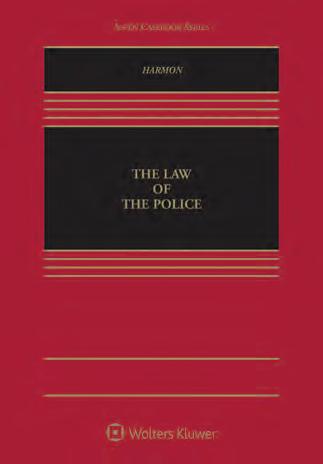
The Law of the Police
RACHEL HARMON WOLTERS KLUWER
As debates about policing pervade the public conversation, Professor Rachel Harmon has written the first casebook to look at the laws that govern police conduct in the United States.
“The Law of the Police” takes on the question of how the law shapes policecitizen encounters and how the law might be leveraged to make policing serve the public better.
Harmon, a former federal prosecutor who directs the Law School’s Center for Criminal Justice, has taught a course on the laws governing police for 15 years. She came to UVA Law in 2006 after spending eight years as a federal prosecutor in the U.S. Department of Justice’s Civil Rights Division.
“I came to the Law School from practice, where I spent years prosecuting civil rights cases, including against police officers,” she said. “Over time, I got frustrated with criminal prosecution as a response to police misconduct. Prosecuting illegal police violence can be important, but I knew there had to be better ways to prevent problems in policing.”
Through her evolving lens, the book explores laws and legal rules that make policing more or less harmful, and where there’s room for improvement.
—Eric Williamson and Mary Wood
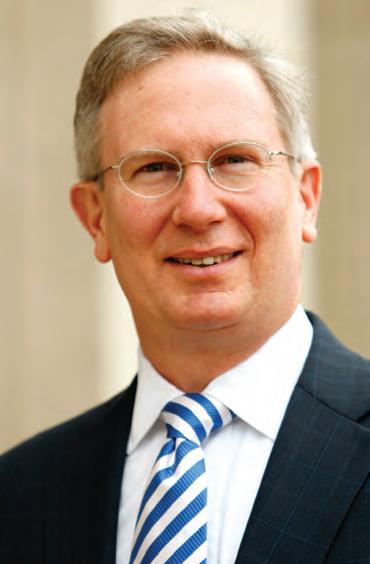
WHEN INDEX FUNDS ARE REALLY MANAGED FUNDS
Managers of index funds are increasingly taking on the role of investment advisers, and federal regulators should treat them as such, Professor Paul G. Mahoney argues in a new paper.
Mahoney, whose teaching and research focuses on securities regulation and corporate finance, recently coauthored “Advisers by Another Name” with University of Toronto law professor Adriana Robertson. In the paper, they explain why the U.S. Securities and Exchange Commission’s policies are outdated in how they regulate some index funds, which consist of a portfolio of companies meant to track a market index, such as Standard & Poor’s 500 Index, rather than being actively managed. The professors offer a solution to close regulatory gaps on index funds that are blurring the boundaries.
What inspired you and your co-author to write this paper?
We observed that the index ❱ Paul G. Mahoney is a David and Mary Harrison Distinguished fund market is changing. Professor of Law. Many index funds and exchange-traded funds today are thematic. In other words, they do not try to replicate a broad market portfolio, but instead consist of stocks with some characteristic that the fund selects. Sector-specific index funds and “smart beta” ETFs [exchange traded funds] are an example. These funds blur the line between indexing and active management.
Why have index funds grown in popularity?
There is a substantial body of academic research that suggests that on average, actively managed funds do not outperform the relevant market benchmark (like the S&P 500) net of expenses. That has led many investors to decide to try to match the market return using an index fund rather than try to beat it using an actively managed fund. Index funds are generally less expensive because the fund’s manager does not engage in costly attempts to find undervalued stocks—it just tries to replicate the relevant index.
The problem we are responding to is that the line is becoming blurred. For example, an index fund or ETF that focuses on high-growth biotech companies is obviously not trying to replicate the entire stock market or a substantial segment of it. Implicitly, the fund sponsor is trying to attract investors on the basis that holding this specialized slice of the market will produce superior returns or meet other investment goals.
That is not to say that there is anything wrong with these thematic funds, and our paper does not argue that there is. It simply makes the point that they resemble active funds that have an adviser/sub-adviser structure, and the index provider should be regulated as a sub-adviser.
How is the current system antiquated?
The current regulatory system is premised on the idea that there is a sharp line between index funds and actively managed funds. The latter select stocks that the manager thinks will outperform the market, and the former passively track the market. That was never completely true in the sense that even a broad market index must make choices about which portfolio best reflects “the market.” But it was close enough to justify the different regulatory treatment for a time. It no longer is.
What should the SEC do to better regulate the index fund market?
First, it should recognize that the providers of single purpose indices are functionally the same as sub-advisers, or specialized asset managers to whom some fund managers contract out all or part of the stock selection. The SEC should regulate them as sub-advisers.
Second, the SEC should clarify the distinction between data publishers and advisers. This would not be very disruptive. The SEC should tell index providers that they must have procedures in place to manage potential conflicts of interest between index selection and other commercial or financial interests of the index provider or its affiliates. Large index providers say they do this. It should also require that an index fund’s prospectus disclose the licensing fee for the index as a separate line item rather than bundling it with administrative expenses. Most index providers do not do this and would no doubt object, but there is no good argument why those fees should not be transparent to investors.
How would these new regulations benefit investors?
They would do the two main things that securities law is supposed to do—inform investors about the costs they pay and about the potential conflicts of interest to which they are subject.








